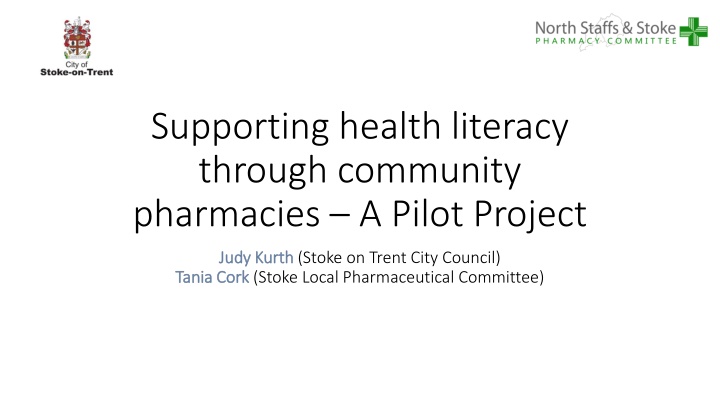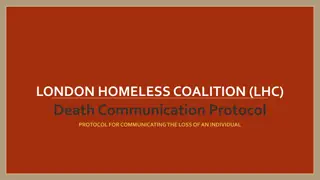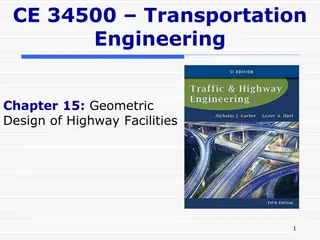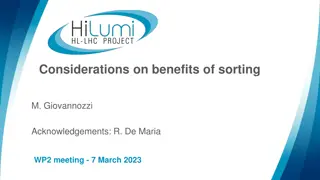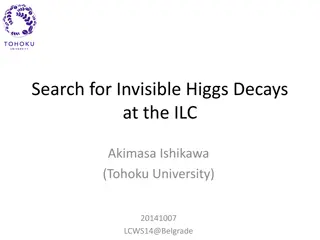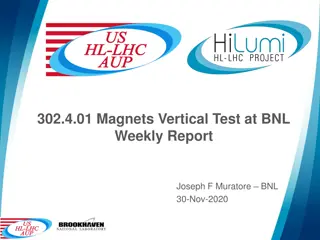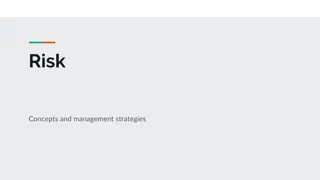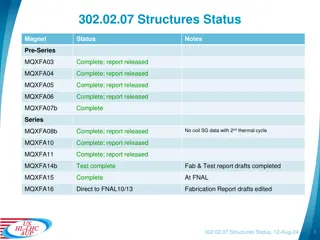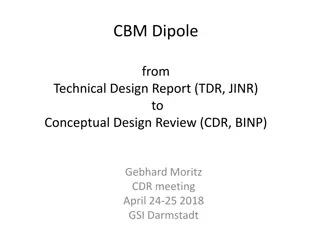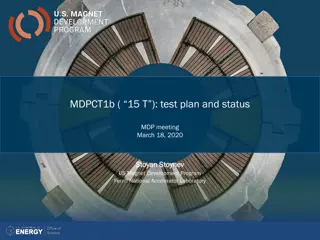Risk Assessment and Personnel Review for the HL-LHC AUP Vertical Magnet Test Stand at BNL
This review focuses on the risk assessment and personnel considerations for the Vertical Magnet Test Stand at Brookhaven National Laboratory in relation to the HL-LHC AUP project. It covers various risks, risk management strategies, post-mitigation risks, and detailed assessments of critical devices in case of breakdown.
Download Presentation

Please find below an Image/Link to download the presentation.
The content on the website is provided AS IS for your information and personal use only. It may not be sold, licensed, or shared on other websites without obtaining consent from the author.If you encounter any issues during the download, it is possible that the publisher has removed the file from their server.
You are allowed to download the files provided on this website for personal or commercial use, subject to the condition that they are used lawfully. All files are the property of their respective owners.
The content on the website is provided AS IS for your information and personal use only. It may not be sold, licensed, or shared on other websites without obtaining consent from the author.
E N D
Presentation Transcript
Supporting health literacy through community pharmacies A Pilot Project Judy Kurth Judy Kurth (Stoke on Trent City Council) Tania Cork Tania Cork (Stoke Local Pharmaceutical Committee)
Health literacy survey in Stoke using the NVS scores suggest that just under a half (49%) of respondents had either a high likelihood, or a possibility of limited health literacy 26% 26% High likelihood of limited literacy Possibility of limited literacy 51% 51% Adequate literacy 23% 23% Base: 1224
People with a high likelihood of limited health literacy are: Significantly more likely to be aged 65 and over Significantly more likely to rate their general health as fair, bad or very bad Significantly less likely to have close relatives or friends whom they speak to or see regularly Significantly less likely to have access to the internet Significantly less likely to have qualifications Significantly more likely to be retired or not working due to long- term illness or disability and less likely to be working as an employee
How community pharmacies can help
So.How can pharmacies help? We think the people who may need to improve their HL are also receiving pharmacy services, mainly regular medicines. We think the people who may need to improve their HL are the people who receive their medicines through a collection and delivery service Therefore we developed a service from pharmacies to assess patient s HL needs and promote the pharmacy as a HL HUB
What did we want to do..? Develop a Pharmacy team led domiciliary service to deliver health literacy related support to people who regularly use a pharmacy delivery services. Team members, with agreement from patients, deliver their medicines and have a discussion about their medicines, general health and lifestyles. They offer whatever support is within their competencies and refer onto other services where appropriate.
How to make it happen
Issues to consider. 1. Key stakeholders LPC, Pharmacy representatives, Public Health 2. Safe-guarding 3. Tendering process 4. Insurance 5. Feasibility study
Training evening for pharmacy teams covering .. Overview of health literacy Who is likely to have poor health literacy Why pharmacy staff are ideal to support poor HL Outline service idea (and role play)
Service specification 25 per visit 15 minutes preparation for visit 1/2hour visit 15 minutes to evaluate/write up/make referrals Service overview Aiming for 200 visits Following an interview schedule Evaluate: Can pharmacies get to people with poor HL? Can staff in pharmacy provide support to improve HL?
Suggested process.. Identify patients who your pharmacy regularly delivers medicines to. When patient orders next delivery ask if they would be happy to have a visit to talk about their medicines and their general health If patients agree, set a time to deliver medicines and talk Before doing visit check through medicines to get a rough idea of health issues At start of visit consent patient, using written consent form. Follow interview schedule and engage patient in conversation After visit is over complete evaluation form.
demographics Gender of patients (n=170) Unknown 5% Male 27% Female 68%
Did patient appear to understand the use of their medicines? (n=170)
How technicians could tell if patients did not understand their medicines Never sure when and how to order my meds Did not know why I need warfarin and the blood test Did not know why taking some tablets Did not know why taking some tablets I always forget to take my tablets my memory is poor Only my wife knows about my meds I do not understand them Don t know what meds are for but just taken them as I am told Did not know how to store my eye drops Takes alendronic acid and lansoprazole, was confused about which I take and when I wish I knew more about why I take my meds
Where do patients get information about their health from Where do patients get information about their health from Freq. 104 49 49 36 30 10 8 1 1 Theme GP surgery Family Pharmacy Media Nurse Hospital Friends Church Not interested
Did patient have difficulty understanding information given by HCP? (n=170)
Why they didnt understand information from HCPs Theme Struggles to understand strong accents Hard of hearing people need to speak slowly and clearly More explanation needed about health conditions Appointments need to be less rushed Health professionals should not use jargon as patient does not understand it More home visits needed More explanation about medicines GPs need to pass up-to-date information to each other
Answers reported for how often patients see people they like (n=74)
Other information sources Family =49 Media =36 Nurse =30 Nurse = diabetes, asthma, wellbeing nurse
When did you last receive health information Freq. Theme Freq. Theme 22 Regularly 2 A couple of months ago 11 Recently 2 Today 4 3 months ago 1 Monthly 4 Not recently 1 A few weeks ago 3 6 monthly reviews 1 2 weeks ago 3 1 month ago 1 Yesterday 3 Week ago 1 Carer comes in daily 3 This week 3 Not disclosed 2 3 monthly reviews 2 Cannot remember
Information about local community services
thematic grouping extracted from comments associated with having inadequate health literacy Examples Theme Patient cannot manage medicines on their own patient has his meds given to him by carer Patient has little knowledge about medicines Poor health literacy, little knowledge of medicines/conditions Patient has medicines-related problems they don t appear to have sought help about Not managing pain well on own, advised review of pain meds with GP Patient has difficulty understanding information or reading information Struggles with small print, has sight problems Patient is managing medicines ok, but has lifestyle issues Understood medications but concerns over healthy lifestyle Patient is scared of vaccinations and screening is scared to have a jab or screening so would not respond to letters
Barriers to implementation Contracting with LPC to then contract with Pharmacies Insurance issues for LPC (not a problem for individual pharmacies) Ensuring a spread of pharmacies across Stoke Staff will be confident in delivering medicines advice what about HL
Limitations /problems Pharmacy staff having enough knowledge in HL Only Stoke on Trent tested Too many questions?
Thank you Questions ???
